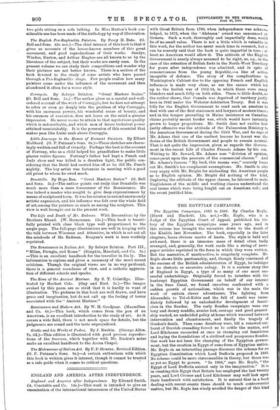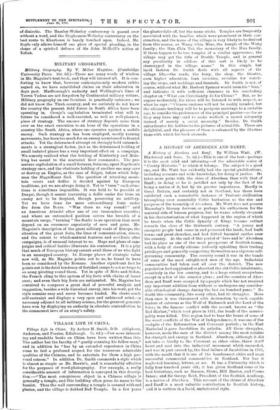THE EGYPTIAN CAMPAIGNS.
The Egyptian Campaigns, 1882 to 1899. By Charles Boyle. (Hurst and Blackett. 12s. net.) —Mr. Boyle, who is a Judge of the Egyptian Court of Appeal, published his his- tory of the Egyptian campaigns some years ago, and in this reissue has brought the narrative down to the death of the Khalifa last November. The book, especially in the later chapters, bears obvious marks of haste. The style is bald and awkward, there is an immense mass of detail often badly arranged, and, generally, the work reads like a string of news- paper articles reprinted in the form in which they were written. But the narrative, if unattractive, is singularly complete. Mr. Boyle shows little partisanship, and, though firmly convinced of the success of the British administration of Egypt, he indulges in no rhetoric or excessive eulogy. It is a curious story this of England in Egypt, a type of so many of our most suc- cessful undertakings. Originally forced to interfere with the bankrupt Egyptian Government on behalf of our interest in the Suez Canal, we found ourselves confronted with a sudden growth of nationalism, which was in the main the work of certain clever adventurers. The fighting from Alexandria to Tel-el-Kebir and the fall of Arabi was imme- diately followed by an unlooked-for development of fanati- cism in the Soudan. The early Soudan campaigns were one long and dreary muddle, armies lost, courage and good general- ship wasted, an undecided policy at home which wavered between intervention and abandonment, and finally the tragedy of Gordon's death. Then came desultory wars, till a renewed out- burst of Dervish crusading forced us to settle the matter, and Lord Kitchener succeeded at once in stamping out fanaticism and laying the foundations of a civilised and prosperous Soudan. Our work has not been the changing of the Egyptian govern- ment, but the creation in Egypt of some form of Egyptian nation. Mr. Boyle in an interesting passage discusses the scheme for an Egyptian Constitution which Lord Dufferin proposed in 1883. No scheme could be more statesmanlike in theory, but there was as yet no Egypt to govern. " In 1883," says Mr. Boyle, "the Egypt of Lord Dufferin existed only in the imagination." It is in creating this Egypt that Britain has employed the last twenty years, and Lord Cromer and Lord Kitchener may well look upon their handiwork with satisfaction. It is natural that in a book dealing with recent events there should be much controversial matter, but Mr. Boyle has wisely avoided the danger of this kind
of dialectic. The Hamley-Wolseley controversy is passed over without a word, and the Stephenson-Wolseley controversy on the best route to Khartoum is barely touched upon. Indeed, Mr. Boyle only allows himself one piece of special pleading, in the shape of a spirited defence of Sir John MeNeill's action at Tofrek.



















































 Previous page
Previous page